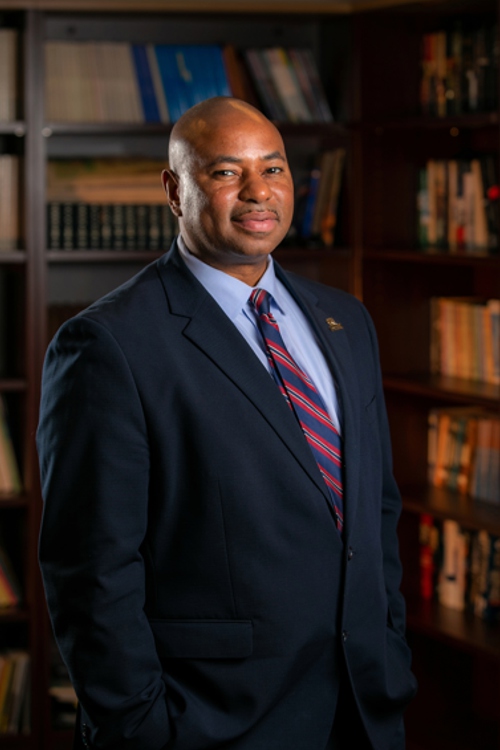Dual Roles

Shawn Long: Researcher/College of Humanities and Social Sciences Dean
KENNESAW, Ga. (Jun 3, 2020) — By Joëlle Walls, KSU Office of Research
As dean of the College of Humanities and Social Sciences, Shawn Long must know how to communicate and build community within the largest college at Kennesaw State University.
His background in organizational communication and organizational science gives him the necessary dynamic perspective in leading an organization with a broad and varied range of disciplines and interests.
“Organizations are everywhere,” he said. “We spend most of our adult lives in some form of organizations, which are dependent upon people interactions. Therefore, I am really concerned with the overall health and well-being of an organization and its citizens.”
Long describes himself as a phenomenologist, a scientist who studies phenomena or observable events through the lived experiences of individuals interacting with those situations.
“My research area mainly focuses on the everyday practices and processes of communication and how those dynamics unfold in different areas, particularly when technology is involved,” said Long, also a professor of communication.
According to the U.S. Bureau of Labor Statistics, over 26 million people are now working virtually at least part of the time, about 16% of the total workforce.
“We often look at the scholarship of virtual work, like most organizational studies, in a positive light rather than look at the germane, day-to-day routines that are not necessarily always stitched together with happiness and prosperity,” he said.
From studying open-ended survey questions to analyzing photographs of home-based offices, Long has found that virtual workers are often lonely and feeling isolated, as they are unengaged in the social interactions prevalent in face-to-face organizational culture.
“The informal organization is equally as powerful as, or more powerful than, the formal organization and virtual workers often miss out on those informal and relational communication opportunities with colleagues, supervisors and clients that make the workplace social interactions personally enjoyable and professionally advantageous,” he said.
For example, Long explained that virtual workers are less likely to be promoted at the same rate as their face-to-face counterparts who are steadily climbing the corporate ladder. In comparison, the titles will change for virtual workers, but they are stuck on a horizontal platform, still doing the same work in the same way with not many options available for promotion.
Moreover, the perception of virtual workers, although changing since it is becoming a more commonplace trend, is flawed. Long found that many managers in organizations, such as high-tech and financial institutions, are rescinding virtual work opportunities because they feel that the employees are not being as productive or are taking advantage of the system.
Long recommends that managers put forth more investment in their employees, providing a robust support infrastructure and communication portal between the face-to-face and remote workers. Managers need to be more transparent to virtual workers about job expectations and promotions.
“My favorite part of the research is how the virtual workers are very much interested in my projects,” said Long. “If I can contribute to the larger conversation, then I am doing my job, not as a disciplinary scholar but as a researcher who is making a difference.”
Article courtesy of the KSU Office of Research. For more stories like this, see The Investigator Research Magazine.











